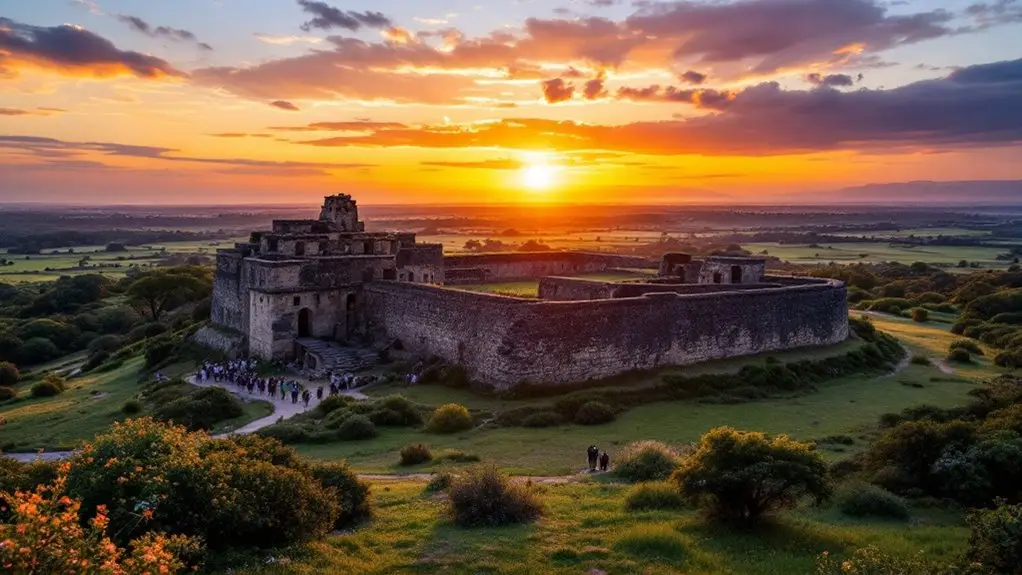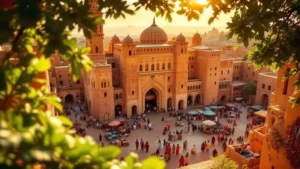When you're planning a visit to African heritage landmarks, it's important to approach your experience with intention and respect. You'll want to research the historical significance of each site and consider engaging with local guides for deeper insights. Dressing appropriately and understanding cultural nuances can enhance your visit, but that's just the beginning. Responsible tourism practices are essential, too. What else should you keep in mind to guarantee your journey is not only enjoyable but also meaningful? Let's explore the key tips that can make all the difference.
Key Takeaways
- Research the historical significance and local customs of each landmark for a deeper appreciation of your visit.
- Engage local guides to gain unique insights and perspectives on the heritage sites you explore.
- Dress appropriately and seek permission before photographing people or sacred spaces to show respect for local traditions.
- Practice responsible tourism by following established pathways and supporting local artisans to minimize environmental impact.
- Reflect on the unique histories and experiences connected to each site to foster a meaningful connection with African heritage.
Plan Your Visit Carefully
Planning your visit to African heritage landmarks is essential for a rewarding experience. Start by researching the historical significance of the sites you plan to explore. For instance, the Rock-Hewn Churches of Lalibela are globally recognized for their breathtaking architecture and rich religious history. Understanding this context enhances your appreciation of the landmark.
Next, check local guidelines to know the hours of operation and any entry fees. Some sites may have limited access or require advance booking, so it's wise to plan ahead.
Consider timing your visit; places like Victoria Falls are particularly awe-inspiring during the rainy season when the water flow is at its peak.
Don't forget to prepare for the local climate and terrain. Appropriate clothing and sturdy footwear are critical, especially when exploring natural sites like the Vallée de Mai Nature Reserve.
Engage With Local Guides
Connecting with local guides at African heritage landmarks enriches your experience in ways that self-guided exploration simply can't match. These knowledgeable individuals provide invaluable insights into the historical significance and cultural relevance of heritage sites, helping you grasp the deeper stories behind what you see.
With firsthand knowledge, local guides often share personal anecdotes, traditions, and practices that you won't find in any guidebook. Many local guides are descendants of the communities that have historically occupied these sites, offering you a unique perspective that fosters a more profound connection to the area's heritage.
By choosing to engage with them, you're not only gaining a richer understanding of African American history but also supporting the community's economy and helping preserve traditional knowledge for future generations.
When selecting a guide, look for those certified or recommended by reputable organizations, as they often prioritize visitor safety and cultural sensitivity. This guarantees that your experience is informative and respectful, allowing you to engage meaningfully with the culture and history that shaped these remarkable sites.
Respect Cultural Traditions
Respecting cultural traditions is essential when visiting African heritage landmarks, as these sites are often steeped in rich histories and deep-rooted customs.
By honoring these traditions, you contribute to the preservation of local cultures and foster a respectful tourism experience. Here are some key practices to keep in mind:
- Understand local customs: Familiarize yourself with the cultural beliefs that surround the landmarks, such as the sacred Rock-Hewn Churches of Lalibela in Ethiopia, to gain deeper insights into their significance.
- Dress appropriately: Many religious or culturally significant sites have specific dress codes. Wearing modest clothing shows respect for these traditions and the values of the community.
- Seek permission for photographs: Always ask before taking pictures of people or sacred spaces. This respect for privacy honors cultural norms and fosters goodwill.
- Join guided tours: Engage with local experts who can share valuable insights into the historical significance of the landmarks, enriching your understanding and appreciation of the heritage being explored.
Practice Responsible Tourism
Responsible tourism is about more than just visiting beautiful sites; it's about engaging with the culture and community in a meaningful way. To truly honor the heritage of African landmarks, start by researching their cultural significance and historical context. This knowledge demonstrates respect for the site and its people.
When exploring, choose guided tours led by local experts. Not only do they provide authentic insights, but they also support the local economy and foster responsible interactions with the community.
Always follow established pathways and guidelines, especially in ecologically sensitive areas like the Vallée de Mai Nature Reserve, to minimize your environmental impact.
Practice sustainable habits by reducing waste, using reusable products, and purchasing from local artisans and businesses. This approach helps you contribute positively to the community you're visiting.
Furthermore, respect local customs and traditions, including dress codes and photography restrictions. By doing so, you foster goodwill and show appreciation for the rich cultural heritage you're experiencing.
Incorporating these practices into your travel plans not only enriches your experience but also guarantees that you leave a positive footprint on the places you visit.
Appreciate Unique Histories
Often, travelers underestimate the profound stories embedded in African heritage landmarks. These historic sites not only showcase architectural brilliance but also resonate with the resilience of African Americans and the rich cultural heritage of their communities.
By taking time to appreciate these unique histories, you connect with the lived experiences of those who came before. Here are some key points to reflect upon:
- Reflect on the Painful Past: Visit places like Elmina Castle and the Maison des Esclaves, which stand as reminders of the transatlantic slave trade, prompting deep reflection on suffering and resilience.
- Explore Architectural Marvels: The Rock-Hewn Churches of Lalibela illustrate Ethiopia's remarkable architectural ingenuity and its deep religious significance.
- Honor the Resourceful Communities: Sites like the Great Dismal Swamp reveal the self-sufficient communities formed by escaped enslaved individuals, highlighting their resourcefulness.
- Recognize Civil Rights Milestones: The Boston African American National Historic Site and the Selma to Montgomery National Historic Trail commemorate struggles for civil rights, emphasizing the importance of civic engagement.
Frequently Asked Questions
What Are the Best Times of Year to Visit These Landmarks?
The best seasons to visit African heritage landmarks often depend on weather considerations and local events.
In the dry season, you'll enjoy pleasant climates and fewer tourist crowds.
However, if you time your visit with cultural festivals or local holidays, you'll experience vibrant celebrations and regional cuisine.
Wildlife migrations can also enhance your trip.
Just keep an eye on climate variations to guarantee you make the most of your journey!
Are There Any Entry Fees or Permits Required?
When planning your visit, you'll find that entry requirements vary by landmark. Some may charge a fee, while others might require permit applications, especially for guided tours.
Keep an eye out for fee variations based on age restrictions or group discounts. It's vital to review visitor guidelines, including opening hours and cancellation policies, to guarantee a smooth experience.
Always approach these sites with cultural sensitivity to enhance your understanding and appreciation.
Can I Take Photographs at All Sites?
When you're exploring heritage sites, capturing memories through photography can feel like weaving a tapestry of historical significance.
However, it's essential to embrace photography etiquette and respect local customs. While many sites allow photos, some may have equipment restrictions or prohibit flash usage. Guided tours often clarify these rules.
Always remain mindful of personal privacy and traditions, and avoid commercial photography unless permitted. Your sensitivity fosters a more respectful connection to the culture.
Is It Safe to Travel Alone to These Landmarks?
Traveling alone can be safe, but it's essential to follow some safety tips.
Research local customs and cultural etiquette to help you blend in. Consider transportation options and accommodation choices that prioritize security.
If you're a solo female traveler, connecting with other travelers can enhance your experience.
Don't forget to have emergency contacts handy, and invest in travel insurance.
What Languages Are Commonly Spoken by Local Guides?
When you visit, you'll find local guides fluent in various languages, often speaking regional dialects that reflect cultural significance. Many have guide certifications, ensuring they share historical context effectively.
To bridge any language barriers, consider using translation apps, enhancing your experience. Their storytelling techniques foster visitor engagement, making the journey memorable.
Familiarizing yourself with these languages and communication tips can deepen your appreciation for the rich heritage and diverse cultures you'll encounter.
Conclusion
By following these tips, you'll enhance your experience at African heritage landmarks while supporting local communities. Imagine standing before the majestic Great Pyramids of Giza, not just as a tourist, but as a respectful visitor who's learned from a local guide about the ancient civilization that built them. Your thoughtful engagement helps preserve these sites for future generations and deepens your own understanding of Africa's rich history. Embrace the journey and create lasting memories.




